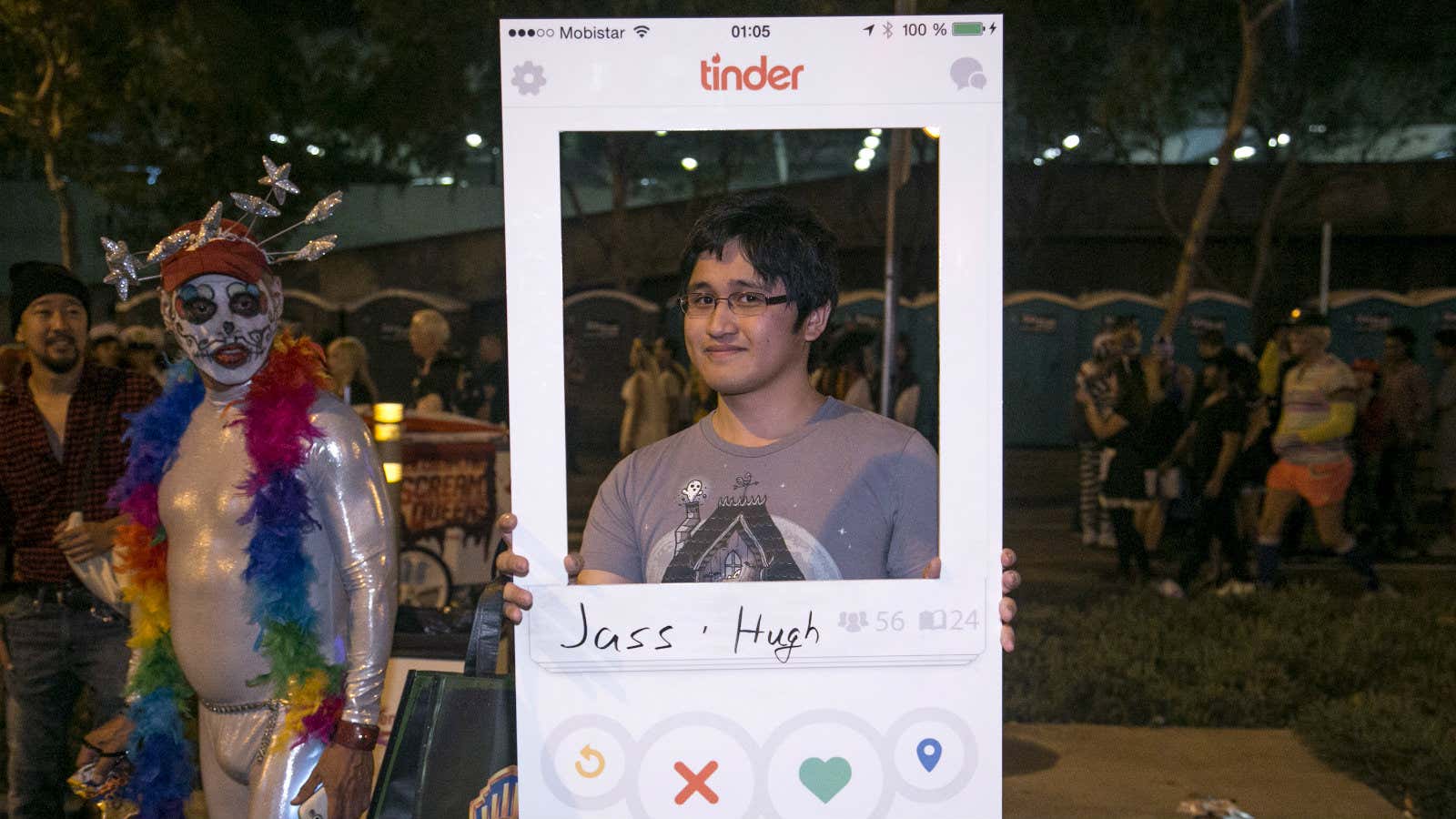Three years after it launched in India, Tinder has chosen to set up its first international office in Delhi. The social app hopes to make India—which currently does not feature among its top five geographies—as one of its “core markets,” founder and CEO Sean Rad said in a statement.
“India is incredibly important for us as we see a lot of opportunity for growth in the country,” Rosette Pambakian, vice president for communications and brand partnerships at Tinder, told Quartz from Los Angeles. “We are growing rapidly in India, and so we thought it would be right to have a team there.”
The company has appointed Taru Kapoor—a Harvard University and Indian Institute of Technology-Delhi graduate—as its India head, who “will focus on establishing the Tinder brand in India, steering its explosive user growth and increasing user engagement by focusing on local user needs,” the company said. Kapoor has previously worked with The Boston Consulting Group and Sequoia Capital India.
With 50% of its population under 25 years of age, India has the potential to grow into a huge market for Tinder. In September 2015, India was already Tinder’s top market in Asia, and among the top 15 global markets, the company’s spokesperson Evan Bonnstetter had told Quartz.
Then, in November, Tinder said it had witnessed a 400% increase in downloads in India over the previous year. The app has also been a big hit among women in the country, who have typically kept away from dating sites.
Tinder sees over 7.5 million daily swipes in the country, and its users in India have the highest number of messages exchanged per match in the world, Tinder reported last September. Globally, Tinder makes over 26 million matches each day with more than 10 billion matches made till date.
The success of Tinder in India has encouraged several Indian entrepreneurs to set up similar matchmaking services—many of which have received strong investor backing. These include TrulyMadly, Woo, Vee, and iCrushiFlush.
While penetration of dating apps beyond tier-I cities in India has often been questioned, Sanchit Vir Gogia, chief analyst at research and advisory firm, Greyhound Research, believes youngsters in small towns are ready to accept such services.
“I recently travelled to tier-II cities like Bhopal, Surat, Lucknow and Jaipur to understand what are the consumer trends there and spoke to over 2,000 small and medium enterprises. I was surprised to see how dynamics in these cities have changed. Consumers in these cities are more than willing to try new services and new technologies,” Gogia told Quartz. “I feel there are enough and more users for apps like Tinder to tap into.”
Indianising Tinder
Though Tinder hasn’t explained what its international office would focus on, it could be looking to localise its offerings for India.
Casual dating is common in most of Tinder’s top markets, such at the US and the UK, but in India, where arranged marriages still thrive, the app’s business model might need a bit of tweaking.
“Tinder may need to add some more privacy features for India because dating in this country is not really looked at in the same way as in the western countries. People may want to be more secretive about what they share. So Tinder needs to be extra sensitive in such areas if it is looking at growth in India,” Pragya Singh, associate director at consulting firm Technopak, told Quartz.
Over the last couple of years, India—the world’s second-largest internet user base—has attracted several American mobile and internet companies such as Uber, Amazon, and Facebook, which have had to localise and set up India offices.
In fact, Uber—which launched in India in August 2013—initially tried to operate in the country from its headquarters in California. However, in June 2015—a few months after an Uber driver raped a passenger in Delhi—the company hired an India head. Since then, Uber has introduced several India-specific features, such has accepting payments in cash, to attract more users.
Tinder could even tap into the strong technology workforce in India, something that companies like Facebook and Twitter have already done. “Attracting talent is of prime importance to young companies like Tinder. And India is placed very well in the sense that it can offer Tinder consumers as well as great talent,” Gogia of Greyhound Research said.
With the largest player in the dating app segment getting more serious about India, analysts also expect to see some consolidation. “We already have a proven example of consolidation in the sector. It is a single group (Match Group) that owns Tinder, Match.com, and OkCupid. So even in India, consolidation is bound to happen,” Singh of Technopak said. “These companies need a database and a community of people, and if a smaller player can provide that, I think they will be very open to making an acquisition.”
